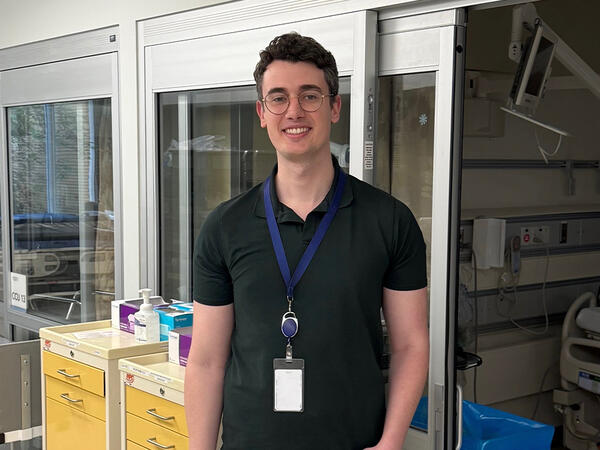A published study has highlighted the value of an innovative U of T interprofessional pain program. The study, led by Laura Murphy, a pharmacist and part-time graduate student at the Leslie Dan Faculty of Pharmacy, identified gaps and areas of overlap between individual health care programs and an interfaculty pain program in order to refine the curriculum.
The University of Toronto Centre for the Study of Pain (UTCSP) developed the Interfaculty Pain Curriculum (IPC) in 2002, when very little pain content was taught in health professions programs. “In 2009, an important Canadian study found that among health sciences faculties, veterinarians got the most training in pain,” says Murphy, an IPC facilitator for 10 years. While individual programs now include more pain content, the IPC still trains 1000 students from U of T’s seven health care programs every year through its intensive three-day program.
The curricula of the IPC is frequently updated to reflect the changing nature of the study of pain, which is still a relatively new field but growing in importance.
“Between 15 and 29 per cent of Canadians experience chronic pain,” Murphy says. “Pain is not just a symptom, but itself a disease that has impact on quality of life to the individual and their family, and an economic and societal cost.”
“Pain is best managed through a team approach”
In the published research, Murphy surveyed faculty involved in developing curriculum for six of U of T’s health professional programs (one program was not able to participate) and the IPC to look for gaps and areas of overlap that can inform updates to the curriculum.
The survey respondents also indicated that they see the interfaculty program as valuable, which Murphy believes is due to the real-world focus of the IPC. “In practice, pain is best managed through a team approach, with the person in pain as an important team member. Pain is a complex biopsychosocial issue, and different health care professions need to work collaboratively,” she says. “The IPC builds towards clinical practice.”
Murphy led the research while pursuing a master’s degree in Clinical, Social and Administrative Pharmaceutical Sciences and working as a Pharmacy Clinical Leader at Toronto Rehab, leading a team of 15 pharmacists. She decided to pursue a graduate degree after working as a pharmacist for almost 10 years. “So many research questions were emerging, and I needed the skills to design studies and analyze data to answer them properly,” she says.
With supervisor Beth Sproule, clinician scientist at CAMH and professor at the Leslie Dan Faculty of Pharmacy, Murphy’s graduate research is focused on a feasibility study examining subjective and objective endpoints of extended release opioids.
Murphy says that pursuing a graduate degree has added more depth to her clinical work. “In the hospital, we’re always coming across questions that I am striving to be better equipped to answer,” she says. “I am fortunate to be a part of the pharmacy department at UHN that highly values research and supports my graduate work.”
More News
Image

Pharmacy alum’s research shows how full-scope practice improves cancer care
Honoured with a national award, Adrian de Boer says his residency experience was a powerful reminder that he's making a meaningful change to the pharmacy profession.
Read More
Image

Pharmacy alum passionate about helping community pharmacists practice to full scope
As a pharmacy leader at Rexall, Heidi Wittke uses frontline experience to lead initiatives that improve patient care
Read More
Image

Bridging Research and Industry: GRIP 2025 highlights innovation and real-world impact
Over 200 attendees from academia, healthcare, and industry gathered last week for the 2025 GRIP symposium, celebrating the depth and diversity of graduate student research.
Read More
